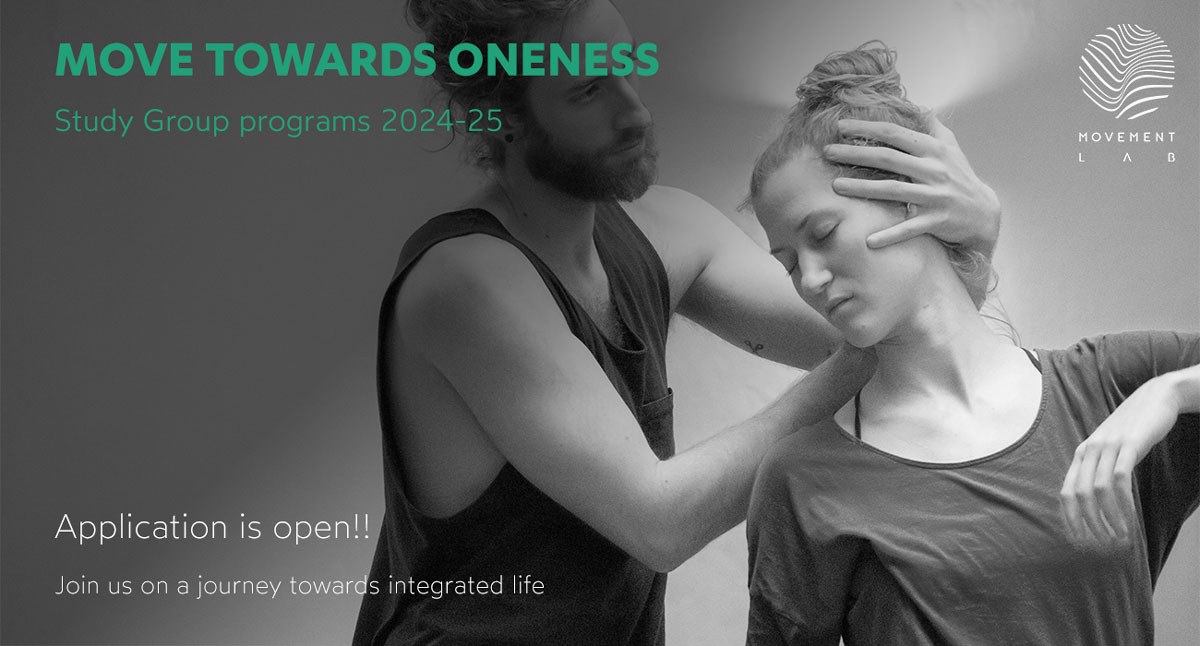Full Contact Curriculum
Module #1 - The foundation of CI technique
In the first module, participants will be exposed to foundational CI concepts through the exploration of repeatable forms and technical improvisations. On the theoretical side, in this module we will examine the ‘Kinetic Flow Compass’ - an empirical system to describe the manifestation of kinetic energy in relation to the environment and other moving objects/people.
Detail breakdown of module 1:
Unit 1 (6 hours): Horizontal situations - 3 ways of changing the point of contact, counter balance vs. grounding weight, sensitivity to role changes.
Unit 2 (6 hours): Floor Flow - Body surfing, floor work technique, entries and exits from table position, creating basic flow.
Unit 3 (6 hours): Vertical support- dynamic weight bearing structures, pelvis lifts, foundations for safe flying and landing
Unit 4 (6 hours): Level changes - exploration of spirals, rolls and slides. Rides to the ground while bearing weight, falling upwards with your partner
Unit 5 (6 hours): Inversions - discovering a new perspective, exploring supported handstands and headstands, bridges and cartwheels.
Unit 6 (3 hours): Big lifts and jumps - effortless momentum enhancement, developing aerial awareness, shoulder lifts and high jumps.
Module #2 - Improvisation and creative attention
In the second module, we will use our technical foundation to explore the vast landscape of partner improvisation. Using specific scores and structured jams, we will cultivate the necessary mental and attentional tools that enable self expression and free communication - such as being grounded, being able to work solo inside a jam, the ability to place clear boundaries on the dance floor, clear sense of self responsibly, good awareness to my competence level and more.
On the theoretical side, we will take a look on the historical context of the development of Contact Improvisation and its ongoing effect on our cultural and corporal norms. In our discourse, we will inquire the importance of physical communication in both our private and social lives.
Detail breakdown of module 2:
Unit 1 (9 hours): Duet/Trio/Duet- How to get in and get out dances freely, how to embrace the complexity of the trio
Unit 2 (9 hours): The ocean of coincidence - how to expand our attention to the ever changing landscape of the jam space
Unit 3 (6 hours): Solo/Duet/Solo - developing true independence to our dances.
Unit 4 (6 hours): Solo/Duet/Group - Introduction to ensemble work
Module #3 - Open Jam
The 3rd module is an optional module. It is structured as a mediating step between self-work and being fully guided in a class scenario. Its purpose is to enable each participant to make a step further towards independence and confident around the material of the program
The module is designed as a fluid structure where each participant can decided the level of intensity and engagement that is suitable for their particular pace and development, from week to week.
Each session in this module will start with 30 minutes of instructions (by rotating guest teachers) followed by 2.5h open jam where participants can engage in a research around the different themes of the program, in a supportive and inspiring environment.
Registration process:
Acceptance to the program is conditioned by a personal interview with Matan Levkowich.
A sense of commitment to the program and the group process will be evaluated and considered as the main factor for acceptance/rejection of an applicant.
Certification
To receive the Movement Lab Study Group certificate you need to:
- Attendance of at least 90% for modules 1+2 and 12 hours of module 3
- Send 2 videos for each module, documenting the materials you have learnt (solo and partner videos).
- Form a peer group and spend a minimum of 6 hours of practice together on the material of the program.
- Submit a final report on your experience in the program detailing what you have learnt and benefited from the program personally.
Certification outcome
The Study Group certificate would support you in the following (in accordance with your own responsibility and self engagements):
- To integrate your body knowledge into your professional engagement in other fields of embodied work.
- To hold group sessions and teach private classes in the fields of contact improvisation and partner work.
